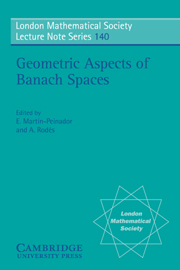Book contents
- Frontmatter
- Contents
- Dedication
- 1 Antonio Plans: a biographical outline
- 2 Infinite dimensional geometric moduli and type-cotype theory
- 3 Hilbert space revisited
- 4 Particular M-basic sequences in Banach spaces
- 5 Behaviour of semi-Fredholm operators on a Hilbert cube
- 6 Operators from H1 into a Banach space and vector valued measures
- 7 Operators on vector sequence spaces
- 8 On the duality problem for entropy numbers
- 9 Mixed summing norms and finite dimensional Lorentz spaces
- 10 On the extension of 2-polynomials in normed linear spaces
- 11 On some operator ideals defined by approximation numbers
- 12 Some remarks on the compact non-nuclear operator problem
- 13 On some properties of A*, L1/H10 as Banach Algebras
- 14 On factorization of operators
- 15 Some properties of Banach spaces Z**/Z
12 - Some remarks on the compact non-nuclear operator problem
Published online by Cambridge University Press: 04 August 2010
- Frontmatter
- Contents
- Dedication
- 1 Antonio Plans: a biographical outline
- 2 Infinite dimensional geometric moduli and type-cotype theory
- 3 Hilbert space revisited
- 4 Particular M-basic sequences in Banach spaces
- 5 Behaviour of semi-Fredholm operators on a Hilbert cube
- 6 Operators from H1 into a Banach space and vector valued measures
- 7 Operators on vector sequence spaces
- 8 On the duality problem for entropy numbers
- 9 Mixed summing norms and finite dimensional Lorentz spaces
- 10 On the extension of 2-polynomials in normed linear spaces
- 11 On some operator ideals defined by approximation numbers
- 12 Some remarks on the compact non-nuclear operator problem
- 13 On some properties of A*, L1/H10 as Banach Algebras
- 14 On factorization of operators
- 15 Some properties of Banach spaces Z**/Z
Summary
Let us consider the following long standing question:
(*) Suppose that X, Y are infinite dimensional Banach spaces. Does then exist a compact non-nuclear operator T:X → Y?
The problem has positive answer under quite general assumptions. Positive answer of the finite–dimensional version of (*) was given in. Close to (*) is another problem posed by Grothendieck and solved by the example of Pisier–s space P: P is an infinite dimensional Banach space such that
1) p ⊗ εp = p ⊗ πp
and
2) P and P' are of cotype 2.
G. Pisier already observed that if P were reflexive or merely if P* had R.N. property then every bounded operator T:P → P' would be nuclear and thus (*) would have negative answer. Indeed, 1) implies that every T:P → P' is integral. Unfortunately no reflexive Pisier's space P is known to exist. We may also translate the problem into the category of locally convex spaces:
Suppose that X, Y are non-nuclear locally convex spaces. Does then exist a compact non-nuclear operator T:X→Y? This generalized problem has a negative answer,: There is a non-nuclear F space X and a non-nuclear DF space Z = Y' such that every continuous operator T: X→Z is (strongly) nuclear. X and Z are obtained via Pisier's observation mentioned above from an example with properties similar to 1):
There are non-nuclear F spaces X, Y such that X ⊗ ε Y = X ⊗ ε Y. Moreover X, Y are hilbertizable.
- Type
- Chapter
- Information
- Geometric Aspects of Banach SpacesEssays in Honour of Antonio Plans, pp. 140 - 144Publisher: Cambridge University PressPrint publication year: 1989



